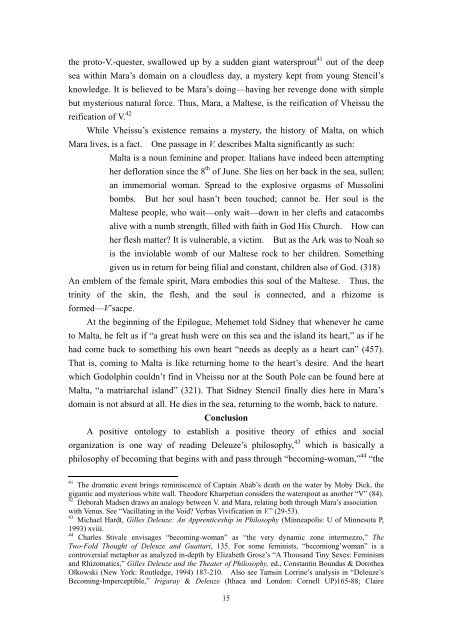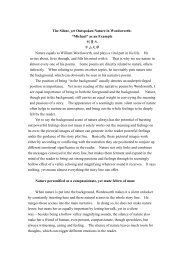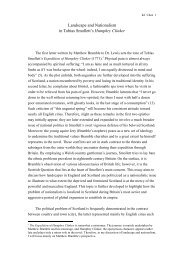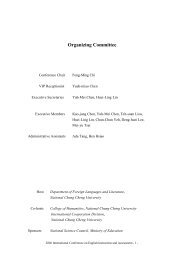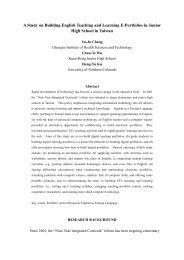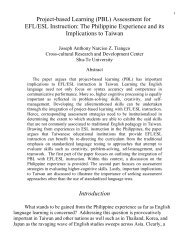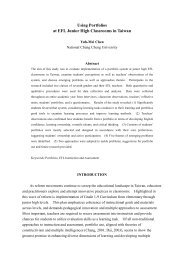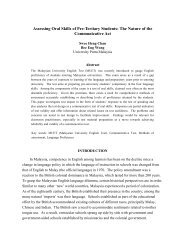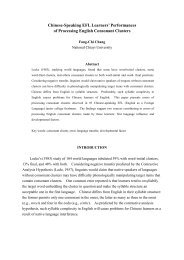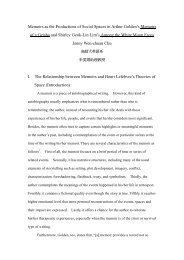V'scape?A Deleuzean Reading of V.
V'scape?A Deleuzean Reading of V.
V'scape?A Deleuzean Reading of V.
Create successful ePaper yourself
Turn your PDF publications into a flip-book with our unique Google optimized e-Paper software.
the proto-V.-quester,<br />
swallowed up by a sudden giant watersprout 41 out <strong>of</strong> the deep<br />
sea within Mara’s domain on a cloudless day, a mystery kept from young Stencil’s<br />
knowledge. It is believed to be Mara’s doing—having her revenge done with simple<br />
but mysterious natural force. Thus, Mara, a Maltese, is the reification <strong>of</strong> Vheissu the<br />
reification <strong>of</strong> V. 42<br />
While Vheissu’s<br />
existence remains a mystery, the history <strong>of</strong> Malta, on which<br />
Mara lives, is a fact. One passage in V. describes Malta significantly as such:<br />
Malta is a noun feminine and proper. Italians have indeed been attempting<br />
her defloration since the 8 th <strong>of</strong> June. She lies on her back in the sea, sullen;<br />
an immemorial woman. Spread to the explosive orgasms <strong>of</strong> Mussolini<br />
bombs. But her soul hasn’t been touched; cannot be. Her soul is the<br />
Maltese people, who wait—only wait—down in her clefts and catacombs<br />
alive with a numb strength, filled with faith in God His Church. How can<br />
her flesh matter? It is vulnerable, a victim. But as the Ark was to Noah so<br />
is the inviolable womb <strong>of</strong> our Maltese rock to her children. Something<br />
given us in return for being filial and constant, children also <strong>of</strong> God. (318)<br />
An emblem <strong>of</strong> the female spirit, Mara embodies this soul <strong>of</strong> the Maltese. Thus, the<br />
trinity <strong>of</strong> the skin, the flesh, and the soul is connected, and a rhizome is<br />
formed—V’sacpe.<br />
At the beginning <strong>of</strong> the Epilogue, Mehemet told Sidney that whenever he came<br />
to Malta, he felt as if “a great hush were on this sea and the island its heart,” as if he<br />
had come back to something his own heart “needs as deeply as a heart can” (457).<br />
That is, coming to Malta is like returning home to the heart’s desire. And the heart<br />
which Godolphin couldn’t find in Vheissu nor at the South Pole can be found here at<br />
Malta, “a matriarchal island” (321). That Sidney Stencil finally dies here in Mara’s<br />
domain is not absurd at all. He dies in the sea, returning to the womb, back to nature.<br />
Conclusion<br />
A positive ontology to establish a positive<br />
theory <strong>of</strong> ethics and social<br />
organization<br />
is one way <strong>of</strong> reading Deleuze’s philosophy, 43 which is basically a<br />
philosophy <strong>of</strong> becoming that begins with and pass through “becoming-woman,” 44 “the<br />
41<br />
The dramatic event brings reminiscence <strong>of</strong> Captain Ahab’s death on the water by Moby Dick, the<br />
gigantic and mysterious white wall. Theodore Kharpetian considers the waterspout as another “V” (84).<br />
42<br />
Deborah Madsen draws an analogy between V. and Mara, relating both through Mara’s association<br />
with Venus. See “Vacillating in the Void? Verbas Vivification in V.” (29-53).<br />
43<br />
Michael Hardt, Gilles Deleuze: An Apprenticeship in Philosophy (Minneapolis: U <strong>of</strong> Minnesota P,<br />
1993) xviii.<br />
44<br />
Charles Stivale envisages “becoming-woman” as “the very dynamic zone intermezzo,” The<br />
Two-Fold Thought<br />
<strong>of</strong> Deleuze and Guattari, 135. For some feminists, “becomiong’woman” is a<br />
controversial metaphor as analyzed in-depth by Elizabeth Grosz’s “A Thousand Tiny Sexes: Feminism<br />
and Rhizomatics,” Gilles Deleuze and the Theater <strong>of</strong> Philosophy, ed., Constantin Boundas & Dorothea<br />
Olkowski (New York: Routledge, 1994) 187-210. Also see Tamsin Lorrine’s analysis in “Deleuze’s<br />
Becoming-Imperceptible,” Irigaray & Deleuze (Ithaca and London: Cornell UP)165-88; Claire<br />
15


